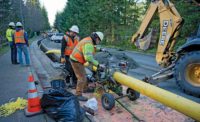General Motors faces a roadblock in its goal to build a future for zero emissions cars — a lack of infrastructure needed to keep electric vehicles on the road. So the company is turning to construction giant Bechtel. In a collaboration that is in its infancy, the two companies will work together to build a public electric vehicle fast-charging network throughout the U.S.
“We know from our customer research that the top three reasons that inhibit EV adoption are price, range and lack of EV charging infrastructure,” says Mike Ableson, vice president of EV infrastructure and charging at GM. “Price and range are very much under our direct control. The charging infrastructure is not.”
The stations would be made available to any EV, regardless of make. GM is second only to Tesla in the number of electric vehicles it sells. In 2017 GM said it would introduce 20 new EVs by 2023.
While Bechtel doesn’t have direct experience in developing EV infrastructure, “we have extensive experience in these multi-market distributed type of programs,” says Kelley Brown, global communications sector lead for Bechtel Infrastructure. “This is really interesting for us. It leverages our strengths ... things we have been doing for years,” such as conceptual network planning, working with power companies and working through the siting and permitting process.
Ableson says Bechtel’s experience in networks and with power companies “will enable us to move quickly and at a large scale.” The two companies are contemplating creating of a separate entity that third party companies, such as power companies or gas station networks could invest in. While the details are being formalized, the two companies are researching the best technologies and locations.
GM will use anonymous data from its drivers to determine travel patterns to help site the chargers, Ableson says. “The objective, he says, is to site the charging stations where they will be heavily used, and so far “we’re not making any presumption about where that might be.”
GM isn’t the first car company to work on solving the EV infrastructure problem. Tesla has developed its own car-charging network, and Volkswagen created subsidiary Electrify America to build out a car- charging network as part of a $2-billion settlement in the U.S. over VW’s emission cheating scandal. Last year, Electrify American tapped Black & Veatch and SAI Group to build a coast-to-coast network of more than 2,000 fast-charging electric vehicle stations in 39 states.
According to a May report from Bloomberg New Energy Finance, more than 2 million electric vehicles were sold in 2018, and by 2040, 57% of all passenger vehicles will be electric. The report points out that electrification is spreading rapidly to other sectors, and that by 2040, 56% of light commercial vehicles and 31% of medium commercial vehicles in China, the U.S. and Europe will be electric.“Long-haul, heavy duty trucks will be harder to electrify,” according to the report. “There, natural gas and hydrogen fuel cells will also play a role.”
Ableson says GM hasn’t said what type of electric vehicles it will be introducing, but said the company will “be moving beyond the current market segments.”




Post a comment to this article
Report Abusive Comment